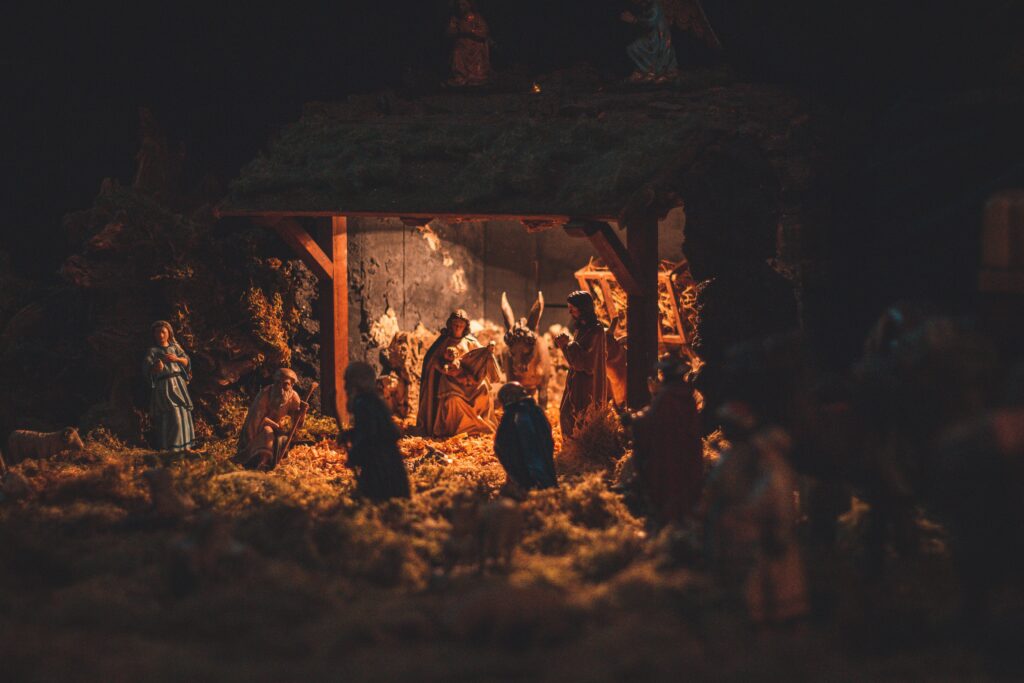It is easy to feel disconnected from God at Christmas. This is ironic, of course, because the entire focus of our celebration is that great, angelic proclamation, “Immanuel, God is with us!” The good news of the incarnation takes center stage: the Son of God has come to dwell with His people. The Holy One of Israel, wrapped in inaccessible light, has broken through the veil which kept us apart and is now wrapped in swaddling clothes and lying in a manger.
And yet despite all the songs of Mary and Joseph and the baby Jesus, despite the ornaments and lights, the liturgies reminding us of God’s promises, and the Advent candles lit to symbolize Christ’s victory over darkness; despite it all, we still hurry through the Christmas season and come out the other end exhausted and somehow empty.
Very often we feel a lot like Charlie Brown. All around us we see the symbols of joy and merriment, and we know how we are supposed to feel, and yet often we just cannot seem to stir those emotions up to the surface. For Charlie Brown the holiday blues were cured with the recitation of the Biblical story. For us, the story might only touch our hearts in passing. Reading again about the shepherds and angels and wise men can feel a lot like singing a song for the one thousandth time only to discover that the power is gone.
I believe that sometimes we can feel disconnected in this way for two reasons. The first reason is pretty obvious, although a solution to the problem might be very hard to come by. We are simply too busy during the Christmas season. We are attempting to do too much in too little time, and it is no wonder we round off the year feeling utterly exhausted. With all the running and preparations, all the last minute details we are trying to work out at the eleventh hour, our minds are stretched in a hundred different directions.
The unfortunate, and inevitable, result of all this busyness is that we never really give ourselves the time to be still, to quiet our hearts for worship, and to rest in God’s presence. Silence and rest are two luxuries that we cannot afford during the holidays. We simply have too much to do.
As I said, the solution to this problem is not easy to discover or achieve. I believe it would take all of us within the church and within our families making huge shifts to our routines in order to make space for the rest that many of us desire this time of year.
But there is a second reason for feeling disconnected during Christmas that we should not overlook. And I believe this has to do with our approach to the Christmas story.
Often we read the Bible account in the gospels of Matthew and Luke and there is an unspoken assumption that we are merely reading about events that happened back then. The illustrations in storybooks and Hallmark cards of a dark, sleepy Bethlehem gently illuminated by the Christmas star captures our imaginations. We think about those events and even wonder what it would be like to have been there, long ago, kneeling in the stable before the baby Christ.
What we sometimes miss is that this story is as much about us as it is about the men and women who were there at the time of Christ’s birth.
As Christians, we celebrate Christmas not simply as the rehearsal of what happened two thousand years ago, important as that is. We celebrate Christmas because even today Christ can be born in our hearts through faith.
Consider Mary. The story goes that the angel Gabriel appeared before this young woman and gave her staggering news: she was to be the mother of the Christ, the long-awaited savior of Israel (Luke 1:26-33). Although she wondered aloud, as any of us would, how this could possibly be the case (she was a virgin, after all), she did not doubt the good news which was given to her. Instead, she humbly accepted the word and gave glory to God for His inexpressible gift.
The story of Mary was not included in Luke’s gospel simply to share an interesting story about Jesus’ mother. In the narrative, Mary is set up as a character in relief against Zachariah, a priest descended from Aaron, who also received word that he and his wife would give birth to a son. Unlike Mary, Zachariah did not believe the word which was given to him (Luke 1:18-20). He doubted the message, and his voice was taken from him until nine months later when God’s word was fulfilled and his wife Elizabeth gave birth to their son, John the Baptist.
These stories were written for us. They were written down after the death and resurrection of Jesus so that we would be encouraged by the Gospel message.
Mary is, for us, the example of faith. She exemplifies the proper response to the Gospel of Jesus. Unlike Zachariah, who put up roadblocks to faith, Mary humbled herself before the Lord and received what had been promised to her.
In the same way, when we receive the message that Jesus is risen from the dead, Scripture says that we are born again (John 3:5-8). The apostle Paul puts things into perspective for us by saying that when we put our faith in Christ, Christ Himself is formed within our hearts through the work of the Holy Spirit (Galatians 2:20).
When viewed from this perspective, Immanuel takes on new meaning. It is not simply a name referring to the life Jesus once lived in the first century. Instead, it refers to the life He lives today in you. The good news of Christmas is not only that a baby has been born. It is that the Holy Spirit is forming Christ in us day by day.
Paul said that this was the very mystery of our faith, that Christ would be formed in our hearts; that His life would somehow find a home within us and transform us from the inside out. And it is this profound mystery which gives us hope (Colossians 1:27). It gives us hope not simply because we can look back at what God did in the past, nor look ahead to what God has promised to do in the future. It gives us hope because even now Christ is closer to us than the very air we breathe.
Christmas is not simply a time celebrating Jesus being born in a manger. It is also a celebration of Jesus being born in you. God does not want to leave you feeling disconnected. He is speaking to you even now through the story of His Son.
My hope is that this Christmas we would reflect on the story in a new way, that we would receive it not simply as a memory of distant events, but as an invitation from our heavenly Father to receive grace. We may not have the strength to change our busy schedules this year. But perhaps, by faith, we can quiet our feverish minds and hear God singing to us, low and sweet amid the clamor.
Perhaps we will discover again the power and joy of Christmas. Perhaps we will lift our voices and find ourselves among the throng of Heaven, giving glory to the God who has come down to be with His people. Perhaps we will even see, within the little town of Bethlehem, the light which even now dispels the darkness in our hearts. As St. Ambrose wrote long ago,
Your manger is now luminous;
Its glow suffuses night’s dim air,
The barren night now numinous:
May faith direct our footsteps there.






Wonderful message today! I needed to hear it again to help me to pause and rest my mind on the God who is with me, always!!
Thank you, Peter, for this beautiful and timely message! Today has been a day of total rest for me in the midst of these past few busy weeks and the next two days, and it’s the perfect time to reflect on your words and give praise and thanks for this blessed season. Merry Christmas!
Today is Jan. 15 almost a month after Christmas. I am new to your Blog and your writing made me take pause and reflect in a new way. Thank you.
Thank you so much for commenting, Marsha! Glad this post was able to touch your heart in some way.